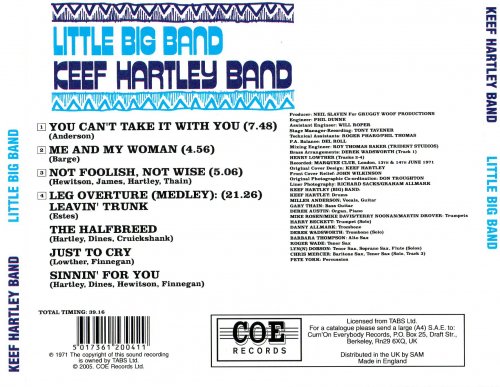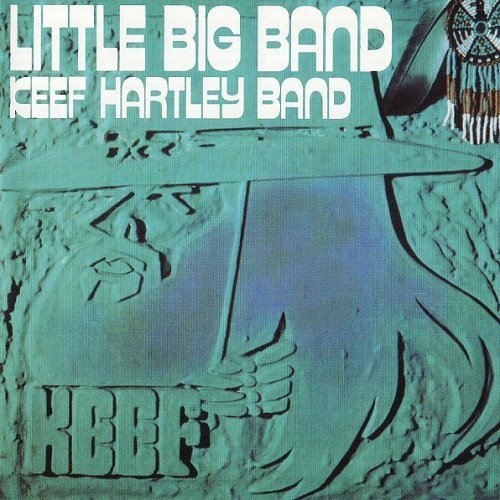
Keef Hartley Band - Little Big Band (Reissue) (1971/2005)
BAND/ARTIST: Keef Hartley Band
- Title: Little Big Band
- Year Of Release: 1971/2005
- Label: COE Records
- Genre: Psychedelic Rock, Blues Rock, Jazz Rock
- Quality: Flac (image, .cue, log)
- Total Time: 42:42
- Total Size: 241 Mb (scans)
- WebSite: Album Preview

Tracklist:
1. You Can't Take It With You (M. Anderson) - 7:15
2. Me And My Woman (Gene Barge) - 4:56
3. Not Foolish, Not Wise (Jath) - 6:50
4. Leg Overture - 23:16
a. Leavin' Trunk (J. Estes)
b. Halfbreed (D. Dines, I. Cruickshank, K. Hartley)
c. Just To Cry (H. Lowther, O. Finnegan)
d. Sinnin' For You (D. Dines, F. Hewitson, K. Hartley, O. Finnegan)
Barbara Thompson - Alto Saxophone
Chris Mercer - Baritone Saxophone, Tenor Saxophone
Gary Thain - Bass Guitar
Keef Hartley - Drums
Miller Anderson - Guitar, Vocals
Derek Austin - Organ, Piano
Pete York - Percussion
Lynn Dobson - Soprano Saxophone, Tenor Saxophone, Flute
Roger Wade - Tenor Saxophone
Danny Allmark - Trombone
Derek Wadsworth - Trombone
Martin Drover - Trumpet
Mike Davis - Trumpet
Mike Rosen - Trumpet
Terry Noonan - Trumpet
Harry Beckett - Trumpet
8 March 1944, Preston, Lancashire, England, d. 27 November 2011. Together with Colosseum, the Keef Hartley Band of the late 60s forged jazz and rock music sympathetically to appeal to the UK progressive music scene. Drummer Hartley had already had vast experience in live performances as Ringo Starr’s replacement in Rory Storm And The Hurricanes. When Merseybeat died, Hartley was enlisted by the London-based R&B band the Artwoods, whose line-up included future Deep Purple leader Jon Lord. Hartley was present on their only album, Art Gallery (now a much sought-after collector’s item). He joined John Mayall’s Bluesbreakers and was present during one of Mayall’s vintage periods. Both Crusade and Diary Of A Band highlighted Hartley’s economical drumming and faultless timing. The brass-laden instrumental track on John Mayall’s Bare Wires is titled ‘Hartley Quits’. The good-natured banter between Hartley and his ex-boss continued onto Hartley’s strong debut, Halfbreed. The opening track, ‘Hearts And Flowers,’ has the voice of Mayall on the telephone officially sacking Hartley, albeit tongue-in-cheek, while the closing track ‘Sacked’ has Hartley dismissing Mayall! The intervening music features some of the best ever late-60s jazz-influenced blues, and the album remains an undiscovered classic.
The band for the first album was comprised of Miller Anderson (b. 12 April 1945, Johnston, Renfrewshire, Scotland; guitar and vocals), Gary Thain (b. 15 May 1948, Wellington, New Zealand, d. 8 December 1975, Norwood Green, Middlesex, England; bass), Peter Dines (b. 17 December 1944, Hertford, England, d. 28 January 2004; organ) and Spit James (guitar). Later members to join Hartley’s fluid line-up included Mick Weaver (aka Wynder K. Frog) organ, Henry Lowther (b. 11 July 1941, Leicester, England; trumpet/violin), Jimmy Jewell (saxophone), Johnny Almond (flute), Jon Hiseman (who guested on percussion and congas) and Harry Beckett. Hartley, often dressed as an American Indian, sometimes soberly, sometimes in full headdress and war paint, was a popular attraction on the small club scene. His was one of the few British bands to play the Woodstock Festival, where his critics compared him favourably with Blood, Sweat And Tears. The Battle Of North West Six in 1969 further enhanced his club reputation, although chart success still eluded him. By the time of the third album both Lowther and Jewell had departed, although Hartley always maintained that his band was like a jazz band, in that musicians could come and go and be free to play with other aggregations.
Dave Caswell and Lyle Jenkins came in and made The Time Is Near.... This album demonstrated Miller Anderson’s fine songwriting ability, and producer Neil Slaven’s excellent production. They were justly rewarded when the album briefly nudged its way into the UK and US charts. Subsequent albums lost the fire that Hartley kindled on the first three, although the formation of his Little Big Band and the subsequent live album had some fine moments. The recording at London’s Marquee club saw the largest ever band assembled on the tiny stage; almost the entire British jazz/rock fraternity seemed to be present, including Chris Mercer, Lynn Dobson, Ray Warleigh, Barbara Thompson and Derek Wadsworth. By the time Seventy Second Brave was released, Anderson had departed, having signed a contract as a solo artist. He was clearly the jewel in Hartley’s crown (or headgear) and the cohesion that Anderson gave the band as the main songwriter, lead vocalist and lead guitar was instantly lost. Future recordings also lacked Slaven’s even production. Hartley and Anderson came together again in 1974 for one album as Dog Soldier but Hartley was largely inactive in music for many years apart from the occasional tour with John Mayall and sessions with Michael Chapman. In the mid-90s he had a carpentry business in Preston, Lancashire, and although it was alleged that he no longer owned a drum kit, attempts were made in the mid-90s to re-form the original line-up of this highly undervalued band (which certainly warrants reappraisal in the 21st century). However, the reunion never transpired, and Keef Hartley died on 27 November 2011 at the age of 67.
The band for the first album was comprised of Miller Anderson (b. 12 April 1945, Johnston, Renfrewshire, Scotland; guitar and vocals), Gary Thain (b. 15 May 1948, Wellington, New Zealand, d. 8 December 1975, Norwood Green, Middlesex, England; bass), Peter Dines (b. 17 December 1944, Hertford, England, d. 28 January 2004; organ) and Spit James (guitar). Later members to join Hartley’s fluid line-up included Mick Weaver (aka Wynder K. Frog) organ, Henry Lowther (b. 11 July 1941, Leicester, England; trumpet/violin), Jimmy Jewell (saxophone), Johnny Almond (flute), Jon Hiseman (who guested on percussion and congas) and Harry Beckett. Hartley, often dressed as an American Indian, sometimes soberly, sometimes in full headdress and war paint, was a popular attraction on the small club scene. His was one of the few British bands to play the Woodstock Festival, where his critics compared him favourably with Blood, Sweat And Tears. The Battle Of North West Six in 1969 further enhanced his club reputation, although chart success still eluded him. By the time of the third album both Lowther and Jewell had departed, although Hartley always maintained that his band was like a jazz band, in that musicians could come and go and be free to play with other aggregations.
Dave Caswell and Lyle Jenkins came in and made The Time Is Near.... This album demonstrated Miller Anderson’s fine songwriting ability, and producer Neil Slaven’s excellent production. They were justly rewarded when the album briefly nudged its way into the UK and US charts. Subsequent albums lost the fire that Hartley kindled on the first three, although the formation of his Little Big Band and the subsequent live album had some fine moments. The recording at London’s Marquee club saw the largest ever band assembled on the tiny stage; almost the entire British jazz/rock fraternity seemed to be present, including Chris Mercer, Lynn Dobson, Ray Warleigh, Barbara Thompson and Derek Wadsworth. By the time Seventy Second Brave was released, Anderson had departed, having signed a contract as a solo artist. He was clearly the jewel in Hartley’s crown (or headgear) and the cohesion that Anderson gave the band as the main songwriter, lead vocalist and lead guitar was instantly lost. Future recordings also lacked Slaven’s even production. Hartley and Anderson came together again in 1974 for one album as Dog Soldier but Hartley was largely inactive in music for many years apart from the occasional tour with John Mayall and sessions with Michael Chapman. In the mid-90s he had a carpentry business in Preston, Lancashire, and although it was alleged that he no longer owned a drum kit, attempts were made in the mid-90s to re-form the original line-up of this highly undervalued band (which certainly warrants reappraisal in the 21st century). However, the reunion never transpired, and Keef Hartley died on 27 November 2011 at the age of 67.
Blues | Oldies | Rock | FLAC / APE
As a ISRA.CLOUD's PREMIUM member you will have the following benefits:
- Unlimited high speed downloads
- Download directly without waiting time
- Unlimited parallel downloads
- Support for download accelerators
- No advertising
- Resume broken downloads


